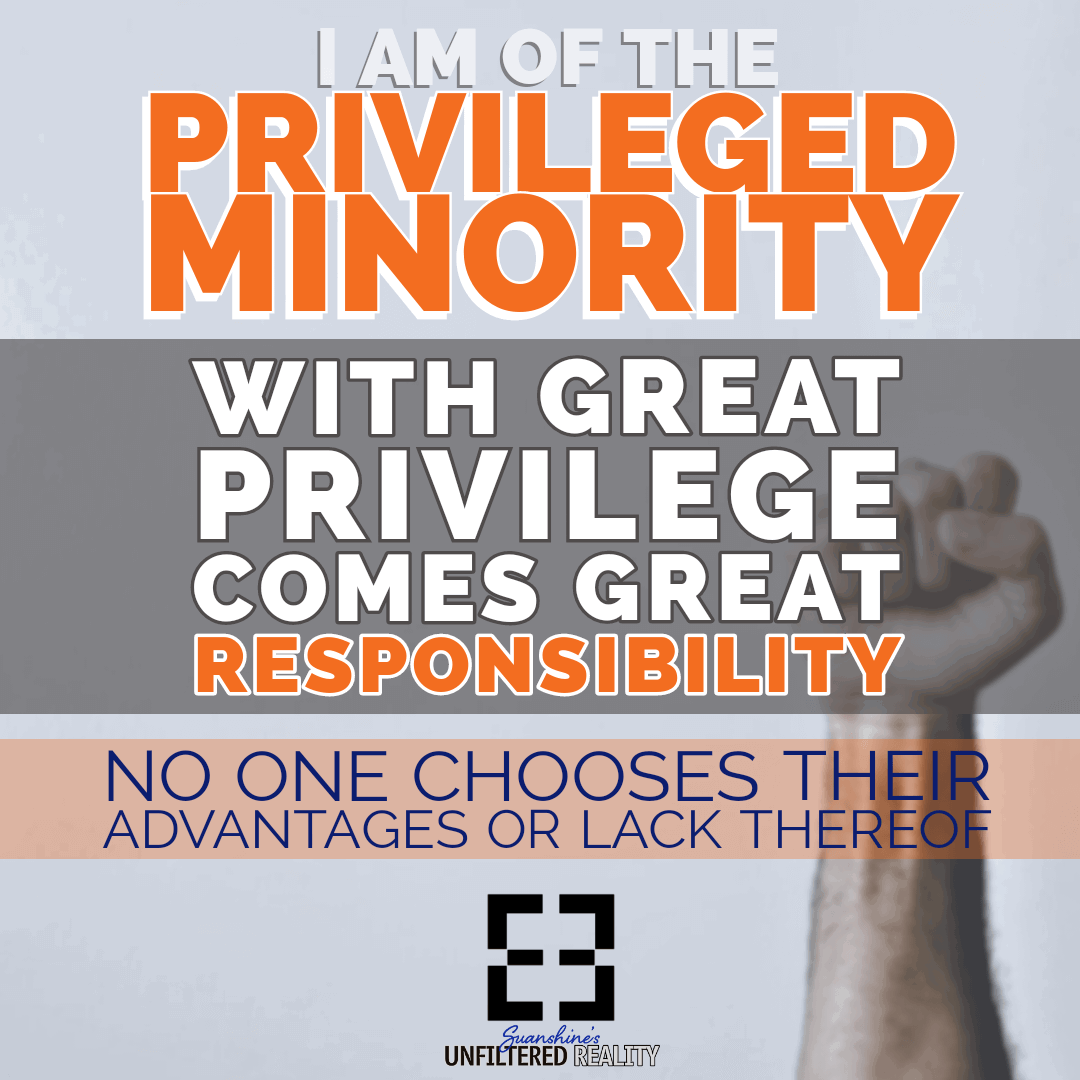Privileged Minority (2025 Update)

My Origin Story: Standing in Truth About Privilege
My origin story is not one of overcoming. Not really. There are some elements of my life you may perceive as disadvantages, but I know better.
Yes, I am mixed race and considered Black according to American culture.
But I have only ever experienced overt racism once in my entire life.
Yes, I'm a woman.
But I was raised in a matriarchal culture.
Yes, my mother is a first-generation African immigrant to the U.S.
But she was raised in an upper-class home with all needs met, so she always managed to provide for herself.
Yes, my father is white (even if that's not what people assume when they see me).
But there are advantages to having a white father and naturally tan skin in America.
Yes, I am 40, single with no kids.
But the freedom and flexibility I've had to grow into myself and invest in my community is a big reason I have the career and deep relationships that I do.
Yes, I am neurodivergent.
But this beautifully complex brain has capabilities that my neurotypical counterparts do not.
Don't get me wrong—I'm aware that the struggles I have had matter. I know that my many fights with depression have required strength and coping skills. I know that my ascent in Corporate America and entrepreneurship required me to work hard, carefully maneuver, and leverage ingenuity.
For years, I felt guilty about living a life of abundance. I let go of that weight. The fact that I've been able to thrive, sometimes effortlessly, has created pain in my spirit when I consider those who struggle. I don't understand why I was born into so much while others have so little.
How could I be born into a home with a loving family, always protective, while just across town something very different occurred? While I was experiencing joy and love, another girl just like me was experiencing pain and fear.
What is privilege?
There is this knee-jerk reaction against the word because the term "white privilege" is used so frequently nowadays. To me, "white privilege" simply means that in America it can be an advantage to be white and, at the very least, it's not usually a disadvantage.
Privilege is not a bad thing—neither is being white. It just "is." Privilege is simply an advantage that you did not earn.
I have so many privileges. I am of the privileged minority, which is a societal exception, not the rule. It is a minority of a minority—a small fraction of the whole.
Claiming My Privileges
I claim my privileges so as not to diminish the struggle of those who have less, very little, or none.
I'm attractive. That's genetics—90% of that is thanks to my ancestors. The remaining 10% is lifestyle and styling.
I'm intelligent. Half of that is due to being fed and loved, while the other half is pure genetics.
I am skilled at the language of business. I understand the nuances of the English language because I could safely read for hours as a child.
I grew up in a house and neighborhood that was safe and quiet. This was 100% due to the fact that my parents worked hard, had some privilege of their own, and had similar linguistic upbringings.
I am confident. I was raised in a family that told me I did not have to earn love—I would always receive it.
I'm spiritually grounded. I was raised in a church that taught me to appreciate the differences of others while loving the world as my own neighbor.
I was raised to think globally. My mother is from another country and culture. I am convinced my dad's worldview came from a different dimension altogether.
My father is white. I enjoy some white privilege from having lighter skin. I benefit from the more insidious parts of colorism.
I am a woman. I can have tan skin and not be perceived as a threat, sometimes blending seamlessly into the crowd.
The Truth About Privilege
Do they make me better than anyone else? Do they make my story less important? Do they mean that I don't deserve to be heard?
No.
The next time someone mentions, or you notice, one of your obvious privileges—such as being:
- the racial majority
- a male
- the cultural majority
- protected
- prosperous
- affluent
- loved
- [insert advantage]
...just take it for what it is. It's simply a fact.
Acknowledging an advantage does not make you less; it makes you more:
- More emotionally available
- More loving
- More aware
- More gracious
- More vulnerable
- More appreciative
- More compassionate
And for the sake of the spirits of the disadvantaged, privilege needs to be acknowledged. Most are not asking for a handout, just a hand up to the place where we, the privileged, started without even having to ask.
Now comes the challenge: Take a deep breath and jump in.
I want you to make a list of every privilege that you have. Don't edit, just let it flow out. Here's one to start you off: If you are reading this on a smartphone, computer, or tablet, it is a privilege that is not afforded to most in this world. (Heck, I mostly "voice wrote"/spoke this on my own smartphone while on a walk through my affluent neighborhood. Hello privilege. It's me, Suan.)
Your list may be short or long. This is about self-reflection and non-judgment. Be gentle with yourself—self-reflection can be tough, especially if it's been a while since your last session.
Once you've completed your list, read it back to yourself slowly. Allow yourself to feel gratitude for these gifts that you were given. Truly appreciate them—what they mean to your life. Now, imagine your life without any one of them, and then with none.
That feeling that comes from understanding what it would be like to lose and be one with less—that is compassion.
Remember that being dismissed is hard. Being undervalued is hard. Being prejudged is hard. Feeling unloved is hard. Feeling vulnerable is hard. And taking responsibility is hard. Self-reflection is hard. Examining the ugly sides of life is hard. Growth is hard. "Adulting" can be hard. Be gentle with yourself as you attempt to soften.
Challenge others to do the same exercise. Be kind and patient in your approach. Challenge others with compassion and understanding in your words and actions. Circle back to your list when you start to lose sight of your blessings. You'll likely find more privileges to acknowledge. Remind yourself over and over that privileges are blessings.
"Anything that is not growing is dead."
Lauryn Hill, MTV Unplugged Album
Whether you are privileged like me, or underprivileged like most, it is important to stand in truth.
Let's stand together.
Let light, love, and gratitude be with you always.
Coach Suanshine
